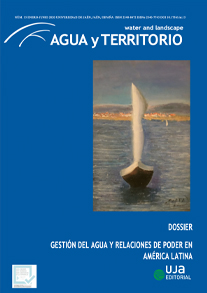El desarrollo de la conflictividad social y política en actividades extractivas y su influencia en la gestión del agua: Discursos de desarrollo y posición de los actores de la región norte de Cajamarca en el Perú
DOI:
https://doi.org/10.17561/at.15.4647Palabras clave:
desarrollo sostenible, Conflictividad social y política, Extractivismo, Conflictos en actividades extractivas, Agua y mineríaResumen
El artículo explora la conflictividad social y política en una región del Perú a partir de la aparición de la industria extractiva y cómo ésta impacta en la gestión del agua. Se propone entender las tensiones y posibles salidas existentes entre las industrias extractivas y el recurso hídrico. Para ello se analizan los discursos que buscan legitimar la posición de los distintos actores que forman parte del conflicto y cómo estos discursos son apropiados para justificar las diversas estrategias políticas que ponen en marcha la comunidad, el Estado, la empresa para hacer valer su posición frente al otro en relación al desarrollo regional y la actividad minera. Se concluye que las oportunidades de desarrollo y la gestión del recurso hídrico dependerán del poder y manejo político por parte de los actores y no de las instituciones que supuestamente deben regularla
Descargas
Referencias
Acosta, A. 2009: La maldición de la abundancia. Quito (Ecuador), CEP/Ediciones Abya Yala.
Cabrera, C. 2017: Conga. Cuando Humala y Heredia paralizaron el desarrollo del cinturón de cobre del norte del Perú. Lima (Perú) CIMADE.
Caravedo, B. 2011: “Desarrollo sostenible, ética, filantropía y responsabilidad social”, en: Vives, A. y Peinado Vara, E. (Coords.): La Responsabilidad Social en América Latina: Manual de Gestion. Washington, D. C. (Estados Unidos), Banco Interamericano de Desarrollo. https://publications.iadb.org/handle/11319/5383, 29-44
Coser, L. 1961: Las funciones del conflicto social. México D. F. (México), Fondo de Cultura Económica.
Coser, L. 1970: Nuevos aportes a la teoría del conflicto social. Buenos Aires (Argentina), Amorrortu.
Dammert, M. 2001: El Estado mafioso, el poder imagocrático en las sociedades globalizadas. Lima (Perú), El Virrey.
Dammert, M. 2008: Dialéctica del territorio / esquizofrenia del lugar, Perú y Suramérica ante los desafíos de la globalización. Lima (Perú), Universidad Nacional Mayor de San Marcos.
De Althaus, J. 2008: La revolución capitalista en el Perú. Lima (Perú), Efe.
Gudynas, E 2015: Extractivismos. Lima (Perú), RedGE, CLAES, PDTG y CooperAccion.
Gudynas, E. 2012: "Caminos para las transiciones postextractivistas”, Alayza, A. y Gudynas, E. (Eds.): Transiciones, Postextractivismo y alternativas al extractivismo en el Perú. Lima (Perú), RedGE y CEPES, 165-192.
Instituto de Estadística e Informática (INEI) 2016. Evolución de la Pobreza Monetaria 2009-2015. Informe Técnico. Lima (Perú), INEI. https://www.inei.gob.pe/media/MenuRecursivo/publicaciones_digitales/Est/Lib1347/libro.pdf
Irigoyen Alvizuri, M. y Chávez Achong, J. 2019: Diálogo cívico: La democracia deliberativa en los conflictos socioambientales. Lima (Perú), Universidad Antonio Ruiz de Montoya: Centro IDEAS y Cooperación Alemana: Pro Diálogo: Instituto del Diálogo.
Laclau, E. 2006: La razón populista. México D. F. (México), Fondo de Cultura Económica.
Monge, C. 2012: “Entre Río y Río. El apogeo de las crisis del extractivismo neoliberal y los retos del postextractivismo en el Perú”, en Layza, A. y Gudynas, E. (Eds.): Transiciones y alternativas al extractivismo en la región andina. Una mirada desde Bolivia, Ecuador y Perú. Lima (Perú), RedGE y CEPES, 74-99. http://ambiental.net/wp-content/uploads/2000/01/TransicionesAlternativasExtractivismoAndinoRedGEClaes2012.pdf
Organización Internacional del Trabajo 1989: Convenio 169 de la Organización Internacional del Trabajo: El derecho de la Consulta. Lima (Perú), OIT/Oficina Regional para América Latina y el Caribe. https://www.ilo.org/wcmsp5/groups/public/---americas/---ro-lima/documents/publication/wcms_445528.pdf
Oxfam Internacional y Social Capital Group, 2007: Responsabilidad Social Empresarial en el sector minero en el Perú. Lima (Perú), Oxfam.
Ramírez Plasencia, J. 2005: “Tres visiones sobre el capital social: Bourdien, Coleman y Putnam”, Acta Republicana, Política y Sociedad, 4(4). 21-36. http://148.202.18.157/sitios/publicacionesite/pperiod/republicana/pdf/ActaRep04/articulos21.pdf
Romero, J. 1999. “Los Nuevos Institucionalismos: sus diferencias, sus cercanías”, en Powell, W. y DiMaggio, P. (Coords): El Nuevo Institucionalismo en el análisis organizacional. México D. F. (México), Fondo de Cultura Económica, 7-29.
Saiz, J. y Jiménez, S. 2008. "Capital social: una revisión del concepto", Revista CIFE, 10(13), 250-263.
Skocpol, T. 1979: Los Estados y las revoluciones sociales. México D.F. (México), Fondo de Cultura Económica.
Webb, R. 2013: Conexión y despegue rural. Lima (Perú), USMP.
Yanacocha 2015: Memorias 2014: Contratación local de Yanacocha. Cumpliendo con Cajamarca. Cajamarca (Perú), MY.
Zavaleta, M. 2014: La batalla por los recursos en Cajamarca. Lima (Perú), PUCP.
Žižek, S. 2003: Ideología, un mapa de la cuestión. Buenos Aires (Argentina), FCE.
Publicado
Número
Sección
Licencia
© Universidad de Jaén
Los originales publicados en las ediciones impresa y electrónica de esta Revista son propiedad de la Universidad de Jaén siendo necesario citar la procedencia en cualquier reproducción parcial o total.
Salvo indicación contraria, todos los contenidos de la edición electrónica se distribuyen bajo una licencia de uso y distribución “Creative Commons Reconocimiento 4.0 España” (CC-by). Puede consultar desde aquí la versión informativa y el texto legal de la licencia. Esta circunstancia ha de hacerse constar expresamente de esta forma cuando sea necesario.














